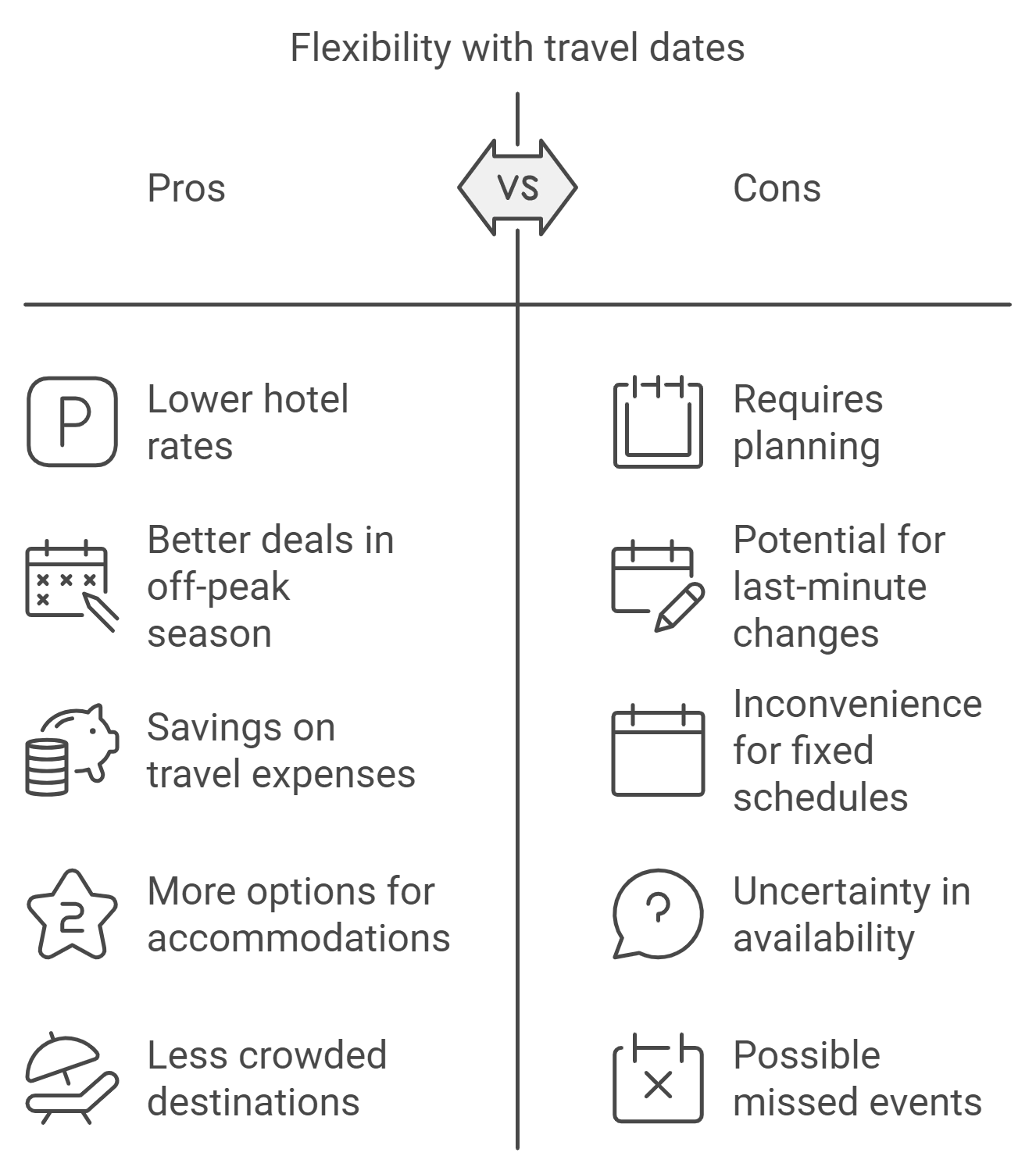Finding affordable accommodations can often feel like a daunting task, especially when traveling to popular or high-demand destinations. Hotel prices fluctuate based on location, season, and availability, leaving travelers searching for the best deals to avoid overspending. The good news is that there are numerous strategies available to help cut down on hotel costs without compromising on comfort or convenience. By combining a few smart approaches, you can unlock a wealth of savings that make your travel experience smoother and more budget-friendly.

In this blog, we’ll explore multiple ways to find cheap hotels, from using online comparison tools to taking advantage of loyalty programs. Let’s dive into the first and perhaps most effective method: using online platforms to compare prices.
1. Use Online Comparison Tools
One of the easiest and most efficient ways to find cheap hotels is through online comparison tools. Websites like “Google Hotels”, “Booking.com”, “Expedia”, and “Kayak” allow you to search for your destination and travel dates, pulling data from multiple booking platforms to give you a comprehensive list of options.
These tools save you time and energy by providing price comparisons across various hotels and booking channels. Once you’ve entered your destination and travel dates, you can narrow down your search with filters based on “price”, “location”, “amenities”, and even “guest reviews”. This allows you to customize your results and focus on the best deals tailored to your preferences.
For example, if you’re traveling on a budget, setting a maximum price filter ensures you only see the accommodations within your range. Additionally, sorting results by “price” or “location” helps you find the best deals near the areas you want to stay. Don’t forget to look at the total cost, including taxes and fees, to ensure you’re getting the most accurate comparison.
2. Be Flexible with Travel Dates
Hotel prices can vary dramatically depending on when you travel. One of the key factors that impact hotel rates is “timing”—both in terms of the day of the week and the season. For instance, weekends and holidays often come with higher rates due to increased demand, while weekdays, especially “mid-week”, tend to be cheaper.

Similarly, traveling during the “off-peak season” can result in significant savings. Hotels are more likely to offer discounts during quieter times when fewer people are traveling, making it an ideal opportunity to score a lower rate. For example, summer tends to be peak season in beach destinations, while visiting in early spring or fall, when tourism is slower, can lead to better deals. Conversely, cities popular for winter sports or holiday markets, like Aspen or Vienna, will see lower rates outside the winter season.
By adjusting your travel dates, even slightly, you could save a substantial amount. Flexibility in your plans is one of the simplest yet most effective ways to reduce hotel costs.
3. Look for Last-Minute Deals
If your travel plans are spontaneous or flexible, “last-minute booking apps” like “HotelTonight” or “One:Night” can be a game changer. These apps specialize in offering deep discounts on unsold rooms, often slashing rates by up to 50% or more. Hotels are eager to fill their empty rooms rather than let them go unused, and they partner with these platforms to offer steep discounts for same-day or next-day bookings.

The potential savings from booking last minute can be substantial, especially in big cities where hotels often have more inventory. That said, last-minute deals aren’t always available, particularly in smaller destinations or during high-demand periods like festivals or holidays. Additionally, while it can be exciting to score a great rate, you run the risk of limited options, and may need to compromise on location, amenities, or room type.
Overall, last-minute booking apps can be a fantastic tool for securing a cheap hotel if you’re willing to take a bit of a gamble and embrace spontaneity.
4. Contact Hotels Directly
Once you’ve found a good deal online, don’t stop there—consider reaching out to the hotel directly. Many hotels are willing to match or even beat the prices you find on booking platforms to avoid paying the commissions these sites charge. By booking directly, you could save more or unlock extra perks that wouldn’t be available through third-party sites.

Additionally, when you call the hotel, there’s an opportunity to inquire about “potential upgrades” or “special offers”. Hotels may offer complimentary room upgrades, free breakfast, or other amenities simply because you booked directly with them. It’s a win-win: the hotel saves on fees, and you get a better rate or enhanced experience. Always mention that you’ve found a great rate online and ask if they can offer something better—there’s often room to negotiate.
5. Consider Alternative Accommodations
If traditional hotels are too expensive, it’s worth exploring “alternative accommodations” like hostels, vacation rentals, or apartment-hotels. These options are not only often cheaper but can also provide a unique and more personalized experience, especially for longer stays or when traveling with a group.

Platforms like “Airbnb” and “HomeAway” offer a range of non-traditional lodgings, from private rooms in someone’s home to entire apartments or houses, allowing you to find options that fit your budget. Hostels, commonly associated with budget travel, have evolved in recent years to include more private and comfortable accommodations that appeal to a wide range of travelers.
These alternatives often offer more flexibility in terms of amenities like kitchens and laundry facilities, which can help cut down on additional expenses. For group travel, splitting the cost of a vacation rental can be much cheaper than booking multiple hotel rooms, and you get the added benefit of communal spaces to share with your companions.
6. Use Loyalty Programs and Membership Discounts
Signing up for “hotel loyalty programs” can be a smart move, especially if you’re a frequent traveler. Many hotel chains offer “member-only rates”, allowing you to access exclusive discounts simply by joining their loyalty programs. In addition to discounted rates, frequent travelers can accumulate points through these programs, which can later be redeemed for free nights, room upgrades, or other perks like free breakfast or late checkout. Programs from major hotel brands like Marriott Bonvoy, Hilton Honors, and IHG Rewards can make a big difference in overall savings.

Beyond loyalty programs, you can also take advantage of discounts through memberships in organizations like “AAA”, “AARP”, or other professional associations. These memberships often come with significant hotel discounts, making them valuable assets for travelers looking to save. By stacking loyalty points with these membership discounts, you can maximize savings and earn rewards more quickly.
7. Choose Your Location Strategically
Where you choose to stay can greatly impact your hotel costs. “Hotels in the heart of the city” or near major attractions tend to be more expensive, while accommodations in “nearby neighborhoods” often come at a much lower rate. By opting to stay a bit farther from the city center, you can save on accommodation costs without sacrificing too much in terms of convenience.

Look for areas that have “easy access to public transportation”, allowing you to reach main attractions quickly and affordably. In cities with well-connected subway or bus systems, staying just a few stops away from the tourist hubs can significantly reduce your expenses. Plus, exploring different neighborhoods can offer a more authentic and local experience while helping you stick to your budget.
8. Look for Package Deals
Booking a “flight and hotel package” together can sometimes offer better savings than booking them separately. Travel websites like Expedia, Priceline, or even airline websites often bundle flights and accommodations, offering discounted rates for both. These package deals are particularly useful for longer trips or international travel, where separate bookings can quickly add up.

One of the key benefits of package deals is convenience: you can book your entire trip in one go while enjoying cost reductions. However, it’s important to compare the total package cost with booking each component separately to ensure that you’re genuinely saving money. Packages can be especially advantageous if you’re flexible with airlines or hotel preferences.
9. Use Cashback and Rewards Programs
For even more savings, utilize “cashback websites” like “Rakuten” or “TopCashback” when booking hotels. These platforms give you a percentage of your spending back as cashback when you book through their referral links. Over time, the cashback can accumulate into a significant amount, especially if you’re a frequent traveler.

Additionally, using “reddit card rewards programs” can also provide an excellent way to cut down on hotel costs. Many credit cards offer travel rewards, points, or cashback for hotel bookings. Some cards even provide additional bonuses when booking through specific travel portals or spending with certain hotel brands. Accumulating these points can lead to free stays or heavy discounts on future trips, making them an ideal tool for the budget-conscious traveler.
Conclusion
Finding cheap hotels doesn’t have to be a daunting task. By leveraging the right strategies—such as using online comparison tools, being flexible with travel dates, and seeking out last-minute deals—you can significantly reduce your accommodation costs. Calling hotels directly, considering alternative accommodations, and tapping into loyalty programs or membership discounts can further boost your savings.

For the best results, combine several of these approaches. Use comparison sites to find the best rates, but don’t be afraid to reach out to the hotel directly. Stay flexible with your dates, and consider staying in nearby neighborhoods to cut costs without sacrificing convenience. Package deals, cashback, and rewards programs can all enhance your savings, making it possible to enjoy affordable accommodations without compromising on comfort.
Ultimately, planning ahead and maintaining flexibility are key to unlocking the best deals on cheap hotels. With a little effort and the right strategies, you can travel more affordably while still enjoying quality stays.
FAQ
1. What is the best way to find cheap hotels online?
The most effective way to find cheap hotels is by using online comparison tools like Google Hotels, Booking.com, Expedia, and Kayak. These platforms aggregate prices from various booking sites, allowing you to compare prices, filter based on preferences, and find the best deals available.
2. How can I save money on hotel bookings by being flexible with travel dates?
Hotel prices vary significantly based on timing. Traveling during weekdays or off-peak seasons, such as mid-week or outside major holidays, can lead to substantial savings. Adjusting your travel dates slightly can help you secure lower hotel rates.
3. Are last-minute hotel deals reliable?
Last-minute deals can offer significant savings, especially through apps like HotelTonight or One, which provide steep discounts on unsold rooms. However, availability may be limited during high-demand periods or in smaller destinations, so flexibility is key.
4. Is it cheaper to book directly with hotels instead of through booking platforms?
Yes, many hotels are willing to match or even beat the prices listed on booking platforms to avoid paying third-party commissions. Booking directly with the hotel may also unlock perks like free breakfast, room upgrades, or discounted rates.
5. What are alternative accommodations to traditional hotels for budget travelers?
If hotels are too expensive, consider alternative accommodations like hostels, vacation rentals, or apartment-hotels. Platforms like Airbnb and HomeAway offer a variety of budget-friendly options that often include additional amenities like kitchens and laundry facilities, which can help reduce overall travel costs.




Comment (0)